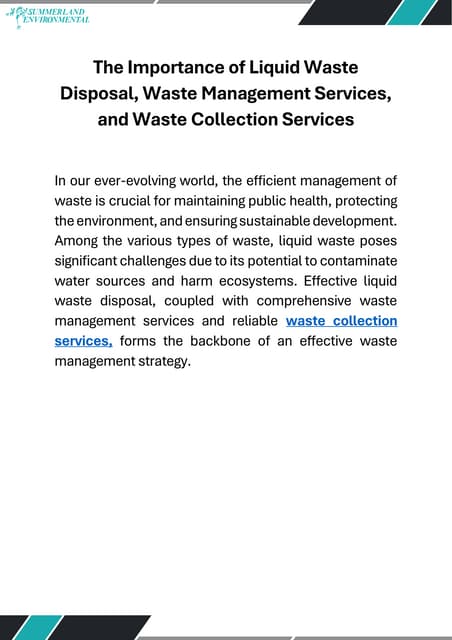The 5-Second Trick For Reclaim Waste
Table of ContentsSee This Report on Reclaim WasteSome Known Details About Reclaim Waste Not known Incorrect Statements About Reclaim Waste Rumored Buzz on Reclaim WasteReclaim Waste Can Be Fun For Anyone
Discover the kinds, occurrences, and types of fluid waste. Domestic sewer waste refers to the waste and items from a domestic sewage-disposal tank. This kind of waste is created by humans in homes, schools, and other buildings. This only consists of septic storage tanks that have a drain area. The appropriate administration and disposal of domestic sewer waste need fluid waste to be transferred to a sewer treatment plant where the correct techniques and tools are put on cleanse and dispose of waste.
Commercial waste usually includes prospective threats, such as flammable products or a mix of fluid and strong waste products, and calls for a much more innovative and thorough disposal process. The disposal of commercial waste typically involves the filtering of waste prior to transport to guarantee risk-free and appropriate disposal. Hazardous waste is created from byproducts and drainage of commercial procedures and production.
This kind of waste can not utilize the very same sewer management transportation or processes as septic or commercial liquids. The hazardous waste administration process needs the inspection and screening of fluid waste before it undertakes the disposal process (liquid waste disposal). Runoff waste is the liquid waste that originates from overflow and excess stormwater in extremely inhabited locations or cities
Drainage waste can cause contamination and flooding otherwise taken care of correctly. Discover more concerning drain cleansing and waste administration. Making certain proper waste monitoring can stop disasters and minimize environmental damage. Both people in household settings and specialists in business or production industries can benefit from recognizing the processes and guidelines of fluid waste management.
What Does Reclaim Waste Mean?
Get in touch with PROS Solutions today to find out about our waste management and disposal solutions and the proper means to take care of the fluid waste you produce.
(https://sitereport.netcraft.com/?url=https://reclaimwaste.com.au)Do you know what takes place to your water when you draw the plug, purge the bathroom or drain the cleaning equipment? No? Well, it's worth recognizing. This so-called 'wastewater' is not only a crucial resource however, after treatment, will certainly be released to our land, waterways or the sea. Used water from bathrooms, showers, baths, kitchen sinks, washings and industrial processes is referred to as wastewater.

water used to cool down machinery look these up or clean plant and tools). Stormwater, a kind of wastewater, is overflow that moves from agricultural and city locations such as roofings, parks, gardens, roads, courses and gutters right into stormwater drains pipes, after rain. Stormwater moves without treatment directly to neighborhood creeks or rivers, eventually reaching the ocean.
Top Guidelines Of Reclaim Waste
In Queensland, the majority of wastewater is treated at sewage treatment plants. Wastewater is moved from domestic or industrial sites with a system of drains and pump terminals, referred to as sewage reticulation, to a sewage therapy plant. Local federal governments develop, maintain and operate most sewer therapy plants. Operators are licensed under the Environmental Management Act 1994 to discharge treated wastewater at an appropriate ecological criterion right into rivers.
The Division of Natural Resources advises regional federal governments concerning managing, operating and preserving sewerage systems and therapy plants. In unsewered locations, city governments may require householders to mount specific or home sewage treatment systems to deal with domestic wastewater from toilets, kitchens, restrooms and washings. The Department of Natural Resources authorizes using house systems when they are confirmed to be reliable.
A lot of stormwater receives no treatment. In some brand-new communities, treatment of some stormwater to get rid of clutter, sand and gravel has actually begun utilizing gross pollutant catches. Wastewater treatment occurs in 4 stages: Eliminates solid matter. Bigger solids, such as plastics and various other objects incorrectly released to sewage systems, are eliminated when wastewater is gone through displays.
Utilizes tiny living organisms knows as micro-organisms to damage down and get rid of remaining dissolved wastes and fine particles. Micro-organisms and wastes are integrated in the sludge.
All About Reclaim Waste
Nutrient removal is not offered in all sewer therapy plants due to the fact that it requires expensive specialised tools. It is coming to be extra usual in Queensland. Clear liquid effluent generated after therapy may still contain disease-causing micro-organisms. If this effluent is released into waterways such as rivers or the sea, the micro-organisms will eventually die out.

A lot of wastewater streams into the sewage system. Under the Act, neighborhood federal governments provide authorizations and licences for eco pertinent activities (Periods) entailing wastewater launches that may have a neighborhood effect.
6 Simple Techniques For Reclaim Waste
Tracking supplies accurate information about water high quality and can verify that licence problems are being satisfied. The info gotten through monitoring offers the basis for making water high quality choices.